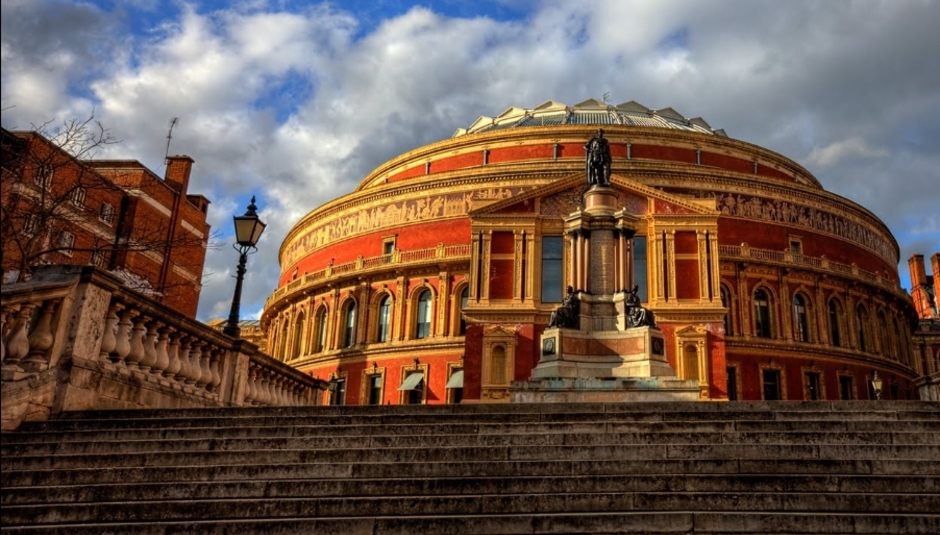Please Note: More or less all the music at this year's Proms can be found on this Spotify playlist.
While the rest of the world has been fretting about the weather at Latitude and indulging in the interminable “Are festivals dead?”/”There are too many festivals!” debate, one music festival has been quietly getting on with planning almost two months of music in the heart of London. When most festivals were in their infancy, this one was already a venerable institution. It doesn’t care that it clashes with the Olympics, because it’s already done that twice. Even though it regularly books thousands of performers, you could easily attend dozens of its concerts for the same price as a weekend ticket elsewhere. Unlike other festivals, this one doesn’t just wheel out dusty old musicians from the last century, it brings out a few from the centuries before that as well. Surely something this good would have sold out already? Nope! Tickets never sell out beforehand – all you have to do is turn up on the day of the concert.
In case you haven’t worked it out from the deliberately patronising, Benjamin-Britten-referencing headline above, the festival I’m talking about is The Proms. The impression that most people have of The Proms is usually based on the infamous Last Night – an achingly middle-class affair topped off with and outpouring of musical patriotism and unselfconscious flag-waving. But aside from this faintly nauseating expression of Britishness, the reality of the Proms is much like any other festival – a lot of great musicians playing great music. It’s as simple as that. Don’t believe me? Have a look at what the Simón Bolívar Symphony Orchestra did there a few years ago (start the video at 0:50):
Leave your preconceptions at the door of the Royal Albert Hall and an entire musical world can open up for you, a world which might even change your whole outlook on music. Don’t be put off – you don’t need specialist musical knowledge in order to attend any more than you need an art history degree to enter Tate Modern. Promming (buying a standing ticket on the day of the concert) is incredibly easy and unbelievably good value, as tickets are just five pounds each and concerts frequently include several hours of music. If you’re going to be in London at any point from the 13th of July to the 8th of September, you have no excuse not to go to at least one Prom. This music is for everyone, not just people draped in Union Jacks, pretending to know the words to Jerusalem. You owe it to yourself to attend, and reclaim this music from the stuffy traditionalism which is stifling it.
Proms Pointers
Going to the Proms can be a complicated business, so here are a few tips:
1. Promming - Prom is short for promenade concert, and refers to the fact that up to 1400 standing tickets are available on the day of every concert. Most Proms start at around 7:30, so if you want to Prom (it’s a verb as well as a noun), turn up at least a couple of hours beforehand, or earlier if the concert is likely to be popular. Then join the queue, which is usually on the stairs to the south of the hall. If there are hordes of people already wrapped several times around the block, you might want to come back another day, but if not, take your place at the back of the line. A member of staff will then give you a raffle ticket which marks your place in the queue and allows you to leave temporarily to grab some food and drink, get some money out (because you can only pay with cash) or whatever else you need to do. A cash machine and toilets can be found at the Science Museum around the corner on Exhibition Road. Then re-join the queue in your previous position and wait to enter. Purchase your ticket on your way into the hall, and make your way to the arena. Once inside, there are a few other things you need to know:
2. Lower your expectations - Seriously. The RAH is notorious for its acoustic problems, and no amplification is used, so the orchestra won’t sound as loud as it really ought to. Stand nearer the front and things will sound better.
3. To the left, to the left - If the concert you’re attending features a piano, make sure you stand towards the left-hand side of the arena, or you won’t be able to see the pianist.
4. Talking Heads - Have a chat with your fellow Prommers. They’re generally a friendly and knowledgeable bunch who will probably be happy to answer any questions you might have about Promming, the music or the performers. I might even be in the queue myself, so track me down if you feel like having a long and involved conversation about Gustav Mahler.
5. Relax - As with most other classical concerts, there is no dress code. In fact, I’d advise wearing something outrageous just to annoy the smart-casual brigade. If the music is unfamiliar, just let it flow over you, because you don’t have to understand everything immediately. Your response is just as valid as that of a seasoned listener.
6. Clap - The issue of where and when to clap is particularly problematic at classical concerts, as several recent articles have pointed out. For example, if a symphony is being performed, applause is generally not given between the separate movements, but saved until the very end of the piece instead. Supposedly this helps to keep a sense of the work as a whole. This convention creates tedious moments filled with extravagant throat-clearing, sweet-wrapper-rustling and sheet-music-shuffling. My view on this matter is: Clap wherever you want. If you enjoyed the music, show it, and ignore the frowning and shushing of the pious traditionalists around you. Nevertheless, it’s probably a good idea to turn your phone off, or you may have to, ahem, face the music.
7. Clap some more – Show your appreciation, because Proms orchestras often have big encores prepared. Classical audiences also tend to clap the orchestra and conductor when they arrive onstage.
8. Be generous - Give some money to the charity collectors at the doors on your way out. During concert intervals, they often shout out how much money they've raised so far.
Prominent Proms
Below are a few of the highlights of the Proms this year, and some further recommendations. If you want to have a browse through all the music on offer this year, then have a look at this gigantic playlist that I've made especially for you. I’ve also used a couple of abbreviations, so PCM = Proms Chamber Music, and PSM = Proms Saturday Matinee.
Prom 7: Handel – Water Music and Music for the Royal Fireworks – 18th July
This Prom features two of Handel’s best-known instrumental suites, performed in a historically informed style by Le Concert Spirituel. This Prom is FREE so get there early. Handel’s Water Music featured in the Jubilee flotilla earlier this year, and include the famous Hornpipe movement and some sections which come pretty close to folk music. The Music for the Royal Fireworks also features some of Handel’s most triumphant tunes. For a more in-depth look at Handel, try Prom 8, which features his oratorio Judas Maccabaeus, played by the wonderful Orchestra of the Age of Enlightenment, who also have a Handel concert coming up at the Barbican later this year.
Proms 9, 10, 12, 13 & 18: Beethoven Symphony Cycle – 20 - 27th July
World-renowned conductor Daniel Barenboim will be leading performances of all nine of Beethoven’s symphonies, interspersed with contemporary works by French composer and conductor Pierre Boulez. The orchestra for these Proms is The West-Eastern Divan, which was co-founded by Barenboim and consists of both Arab and Israeli musicians, echoing the vision of universal brotherhood which Beethoven expounded in his 9th symphony.
Prom 19: Tchaikovsky and Shostakovich – 28th July
Shostakovich’s Cello Concerto (see above) is a brilliant example of the composer’s explosive, spiky modernism, built around the obsessive repetition of a coded musical self-portrait – a powerful affirmation of identity struck against Soviet collectivism. Tchaikovsky’s 6th symphony is one of the most moving of all his orchestral works – you can read more about it (and see a complete performance) in my introduction to the composer. If you like Tchaikovsky, try Proms 43 and 48 too.
PCM3: La Tarantella – 30th July
If you like folk music, then this is the Prom for you. Early music ensemble L’Arpeggiata have proved themselves adept at exploring the boundaries between classical and folk. In this concert they examine the Tarantella, a folk dance which supposedly gained its name from its use as a cure for Tarantula bites. This Prom takes place at Cadogan Hall, so day tickets are available at the venue from 10AM. For more like this, try PSM2 with Les 24 Violons du Roy – a compilation of French baroque music, or PCM4, a selection of impressionistic French chamber music.
Prom 22: Mozart, Knussen and Mahler – 30th July
Mozart’s highly dramatic overture to his opera Don Giovanni kicks off proceedings, followed by the atmospheric 2nd symphony by contemporary British composer Oliver Knussen, famous for his operatic version of Where the Wild Things Are. The bulk of this concert, however, is comprised of Mahler’s vast 7th symphony. I have a huge soft spot for this idiosyncratic work, and I’m sure its strange Nachtmusik episodes, interesting orchestration and lively finale (see above) will convince you too. For more Knussen (amongst others), try PSM4.
Prom 26: Bach – Mass in B Minor – 2nd August
Perhaps the greatest choral piece ever written, performed by the English Concert, who are amongst the finest interpreters of Baroque music working today. A friend recently told me that for him, playing Bach’s keyboard music is like trapped inside the workings of a Swiss watch. Listening to the Mass in B Minor, on the other hand, is like being stuck, Charlie Chaplin-style, between the cogs of a gigantic musical machine. Quite simply, the sound of a genius addressing his God. Hardcore Bach fans may also enjoy PSM1, which includes his Art of Fugue, played by the Academy of Ancient Music. You can read more about Bach in my introduction to the composer.
Prom 27: Wagner & Bruckner – 3rd August
Wagner is a still a highly controversial figure, for reasons which are obvious, but too complex to deal with in a short paragraph like this. If you want to know more, watch Stephen Fry's documentary on the composer. The BBC Scottish Symphony Orchestra will be playing Wagner’s Siegfried Idyll, a sumptuous tone poem composed to celebrate the birth of his son. This will be followed by the Bruckner’s epic 8th symphony (see above), which sounds a bit like a mountain falling onto your face.
Prom 29: Varèse, Muhly, Messiaen and Meredith – 4th August
Interested in contemporary classical music? Try this Prom. First up is an orchestral joke by Varèse, followed by a new work from “indie-classical” darling Nico Muhly. This is followed by Messiaen’s eccentric Turangalîla Symphony, which features an Ondes Martenot, a peculiar instrument frequently used by Radiohead, and finally Anna Meredith’s HandsFree, a work produced for the 20x12 scheme, using only one instrument – the human body. If you enjoy this sort of thing, then look out for PSM3 with the Britten Sinfonia as well as Prom 44 with the London Sinfonietta, which includes post-war works from Ligeti, Xenakis and John Cage’s 4’33”. If you want to explore Cage further, try Prom 47, which celebrates the composer’s centenary. Or, if you prefer contemporary music which is a little easier on the ear, try Prom 62, with YouTube phenomenon Eric Whitacre.
Prom 31: Various Works – 5th August
Uncertain about which Prom to attend? This eclectic, quick-fire concert might be up your street, as it features an overture from Wagner, Bruch’s stunning Scottish Fantasy (featuring the brilliant violinist Nicola Benedetti), Strauss’s exuberant tone poem Don Juan (see above) and Respighi’s colourful Pines of Rome. Benedetti is also performing works by Bach, Brahms and Korngold at PCM5 on the 13th of August. If you’re looking for another varied concert, try Prom 71, which features works by Brahms, Beethoven, Schoenberg & Gershwin, or Proms 28 and 50, which have everything from Mozart to Stravinsky.
Prom 42: Prokofiev, Neuwirth & Bartók – 13th August
The UK premiere of a contemporary work by the Austrian composer Olga Neuwirth sandwiched between two modernist masterpieces – Suite No.1 from Prokofiev’s ballet Romeo and Juliet (you know, Prokofiev! From The Apprentice!) and one of Bartók’s most popular pieces – the confusingly-titled Concerto for Orchestra. Fancy some more 20th century classics? Then listen to Prom 21 – the Aldeburgh World Orchestra (assembled from across the globe via YouTube) will be playing Britten, Mahler, and Stravinsky’s iconoclastic masterpiece, The Rite of Spring.
Prom 45: Various Works – 15th August
A rare chance to see the São Paolo Symphony Ochestra, who will be performing Dvorak’s “New World” symphony (see video above), one of the most popular classical pieces ever written, which was inspired by the composer’s time in America. Following this theme, all the other works played will be by composers from the Americas – Copland and Tower from the North, Villa-Lobos and Ginastera representing the South.
Prom 46: Vaughan Williams – 16th August
A triple bill of late-Romantic English composer Vaughan Williams’s symphonies. His freestanding orchestral pieces may be better known, but the symphonies are deeply underrated and not performed often enough. The quietly soothing 5th symphony is the most famous, but the 4th and 6th show an angrier, modernist side to his output. Can’t get enough English composers? Try Prom 23.
Prom 51: Glinka & Shostakovich – 21st August
Energetic conductor Andris Nelsons and the City of Birmingham Symphony Orchestra return to the Proms with a frenzied overture by Glinka (see above), alongside Shostakovich’s monumental 7th symphony, famous for the terrifying march in its first movement. Does it signify the Nazi invasion of Russia, Stalin’s rule of fear, or the evil of totalitarianism in general? Have a listen and decide for yourself. If you like Shostakovich as much as I do, then try the 10th symphony at Prom 54, with the (relatively) young Vasily Petrenko conducting the Liverpool Philharmonic. They've specialised in Shostakovich's symphonies recently, so this should be a treat.
Prom 64: Berlin Philharmonic – 31st August
Is the Berlin Philharmonic the best orchestra in the world? Possibly. Is Simon Rattle a curly-haired conducting genius? Pretty much. Is Brahms’s second piano concerto (see video above) the best thing ever? Yeah, I reckon. Is Lutoslawski’s 3rd symphony a nice modernist bonus? It is. Go to this. Because if you don’t, I will.
Proms 67 & 69: Leipzig Gewandhaus Orchestra – 1st & 2nd September
Mendelssohn himself was the music director of the LGO in the 1830s and 40s, so it’s fitting that they will be playing an all-Mendelssohn programme, including famous works like the virtuosic and life-affirming Violin Concerto (see above), as well as hidden gems like the Reformation symphony. They return the following day to play Mahler’s 6th symphony, which has been stuck in my head for about a month. It's that good.
Proms 73 & 75: Vienna Philharmonic – 6th & 7th September
The Vienna Philharmonic is another of the world’s finest ensembles, although they are notorious for not hiring many women. They’ve chosen to play to their strengths with German and Austrian composers – Beethoven’s highly original 4th piano concerto (played by the superb Murray Perahia), Bruckner’s otherworldly and unfinished 9th symphony, Haydn’s joyful London symphony and Strauss’s evocative Alpine Symphony (see extract above) are all well-worth hearing.
My choices are mainly classical and instrumental, but there are also several concerts featuring jazz, opera and world music. Visit the BBC Proms website to find out more.






















